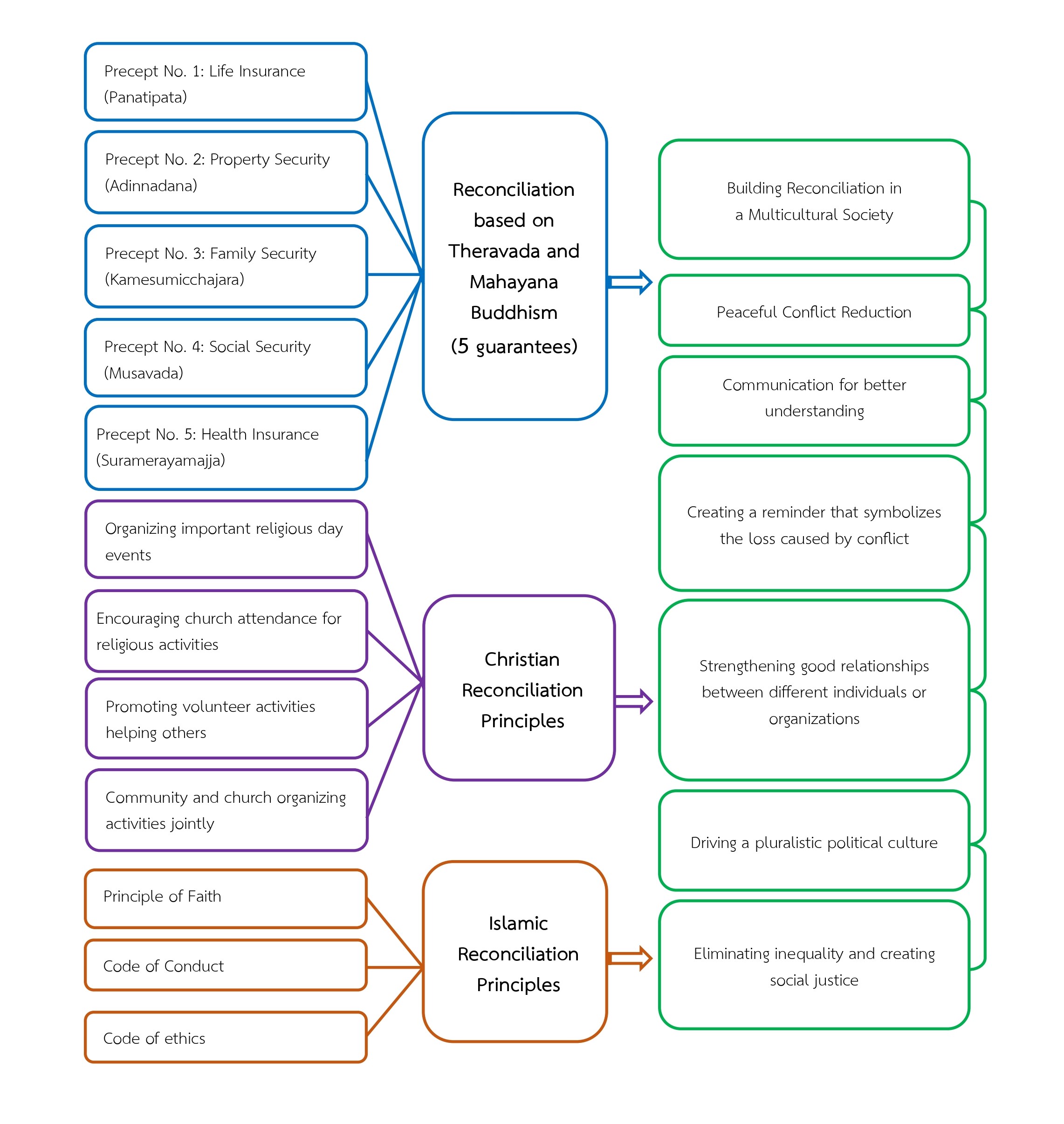CREATING RECONCILIATION IN DIMENSION OF MULTICULTURAL SOCIETY : A CASE STUDY OF WAT LAHARN COMMUNITY OF NONTHABURI PROVINCE
Keywords:
Creating Reconciliation, Multicultural Society, Wat Laharn Community, Nonthaburi ProvinceAbstract
Background and Objectives: Thailand comprises multicultural societies in many communities. Some communities contain various groups of people with diverse cultural dimensions in different diversity. For instance, ethnic diversity comprises Thai, Vietnamese, Chinese, Khaek, and Laos. Other diversity includes language diversity and religious and faith diversity. Despite the variety, some communities establish a consensus that leads to reconciliation in their community. The researcher, therefore, studies the context of building reconciliation in a multicultural society amidst dissension in Thai society, studies the creation of reconciliation in dimension of a multicultural society within a case study of Wat Laharn Community in Nonthaburi province, and presents the achievement of reconciliation in a multicultural society.
Methodology: The study employed a qualitative research method by collecting information from relevant documents and interviews with key informants. The key informants comprised followers from three religions: Buddhism, Islam, and Christianity. The researcher purposively selected all religious people from each mentioned religion. The total key informants consisted of thirty - five persons that included twenty - five persons from each religion, and ten persons for group discussion.
Main Results: The research findings indicated that: 1) The context of building reconciliation in a multicultural society in Thai society was still unable to solve an appropriate number of conflicts because part of some conflicts originated from beliefs and political opinions. 2) Building reconciliation in Thailand consisted of: 2.1) Building reconciliation according to Buddhist principles by using the five aspects of security was concerned with The Five Precepts, that consisted of life insurance (Pāṇātipātā), property security (Adinnādānā), family security (Kāmesumicchācāra), social security (Musāvādā), and health insurance (Surāmerayamajjapamādaṭṭhānā); 2.2) Creating reconciliation according to Christianity comprised organizing religious events, encouraging people to attend church, and promoting voluntary activities; 2.3) Creating reconciliation according to the three principles of Islam, comprised Faith, Practices, and Ethics. 3) Creation of reconciliation in a multicultural society comprised mitigating conflicts with a peaceful settlement, communicating for mutual understanding, constructing a symbolic reminder of loss, encouraging harmony between individuals or organizations, compelling a pluralist political culture, and eliminating inequality.
Involvement to Buddhadhamma: The creation of reconciliation according to the principles of Theravada and Mahayana Buddhism by using The Five Precepts, which are all five aspects of insurance that consist of: The first precept, namely life insurance, implies that all individuals should sustain each other with compassion and empathy; The second precept, namely property insurance, implies that all individuals should support each other and encourage integrity and transparency; The third precept, namely family security, implies that all individuals should promote family institutions by organizing activities to protect the family institution; The fourth precept, namely social security, implies that all individuals should tell the truth, give each other sincerity, and support the community by attending monthly meetings; The fifth precept, namely health insurance, implies that all individuals should encourage activities to lessen, refrain, and give up entangling in ways of squandering wealth and illegal drugs and conduct campaigns against intoxicants.
Conclusions: Creating reconciliation in multicultural society by reducing conflict through peaceful settlements, established communication for mutual understanding, established a symbolic reminder of the loss caused by disputes, facilitated good relationships between different individuals or organizations, compelled for a pluralist political culture, eliminated inequality and established social justice.
References
Announcement on National Strategy (2018 - 2037). (2018). Royal Gazette, Volume 135, Part 82 Kor, (October 13).
Kanchanapan, A. (2008). Multiculturalism in the context of social and cultural transition. [Unpublished Research report]. Chiang Mai University.
King Prajadhipok's Institute. (2012). Research Report: Building national reconciliation. The Extraordinary Committee on Studying the Guidelines for National Reconciliation, the House of Representatives.
Kleesunthorn, A. (2009). Multicultural Studies. (Multicultural Education). In The encyclopedia of the teaching profession in honor of His Majesty the King. Office of the Teachers Council of Thailand.
Phrakru Sirithampan & The working group to drive the 5 Precepts Village Project, Wat Laharn Community. (2019). Performance Report of the Reconciliation Building Project using the principles of Buddhism "Village keeping the 5 precepts" (according to the 20-year national strategic plan), Nonthaburi Province. Wat Laharn Community.
Phramaha Kritsada Kittisophano & Phramaha Kamphon Khunngaro. (2015). Reconciliation Building By Five Precepts Observing Village Project In Ayutthaya Province. Journal of MCU Social Science Review, 5(3),45-62.
Phramaha Serichon Narissaro. (2020). The development of model villages of peace according to religious doctrines (Buddhism, Christianity, Islam). [Research Report Research Project Funded by Mahachulalongkornrajavidyalaya University]. Buddhist Research Institute Mahachulalongkornrajavidyalaya University. http://mcuir.mcu.ac.th:8080/jspui/handle/ 123456789/645.
Phramaha Yuthana Norachettho. (2017). An Analytical Study of the Coexistence Principles of Multicultural Society in Thailand: A Case Study of Buddhist and Muslim Communities in Wat Thakarong Community, Ban Pom Subdistrict, Phra Nakhon Si Ayutthaya District, Phra Nakhon Si Ayutthaya Province. Journal of MCU Buddhist Studies Review, 1(1), 40-61.
Thanasathit, U. (2013). The Role of the Political Development Council and the Strengthening of National Harmony. [Research report financially supported by University of the Thai Chamber of Commerce]. University of the Thai Chamber of Commerce. https://searchlib.utcc.ac.th/cgi-bin/koha/opac-detail.pl?biblionumber=246029&query_desc=an%3A153946.
The appointment of the committee to drive the reconciliation and reconciliation project using the principles of Buddhism. "Village keeping the 5 precepts". (2017). Resolution of the Sangha Supreme Council, No. 28/2017, resolution 676/2017.

Downloads
Published
How to Cite
Issue
Section
License
Copyright (c) 2023 Journal of Buddhist Anthropology

This work is licensed under a Creative Commons Attribution-NonCommercial-NoDerivatives 4.0 International License.








